Challenges and Future of the Auditing Profession in Australia
VerifiedAdded on 2020/03/02
|7
|1579
|149
Report
AI Summary
This report examines the significant challenges confronting the auditing profession in Australia. It begins by highlighting the evolving nature of auditing in a competitive market, emphasizing the impact of IT advancements, globalization, and regulatory complexities. The report identifies key challenges such as the rapid pace of technological change, which includes big data and AI, and the pressures exerted on auditors by clients, which can compromise independence. It also discusses the importance of auditor independence and ethical considerations within the Australian auditing model. Furthermore, the report analyzes regulatory attempts to improve audit quality, including amendments to the Corporations Act and the role of the Accounting Professional and Ethical Standards Board. The conclusion underscores the importance of auditing in the contemporary business setting and the need for auditors to operate effectively despite various challenges. The report references several academic sources to support its findings.
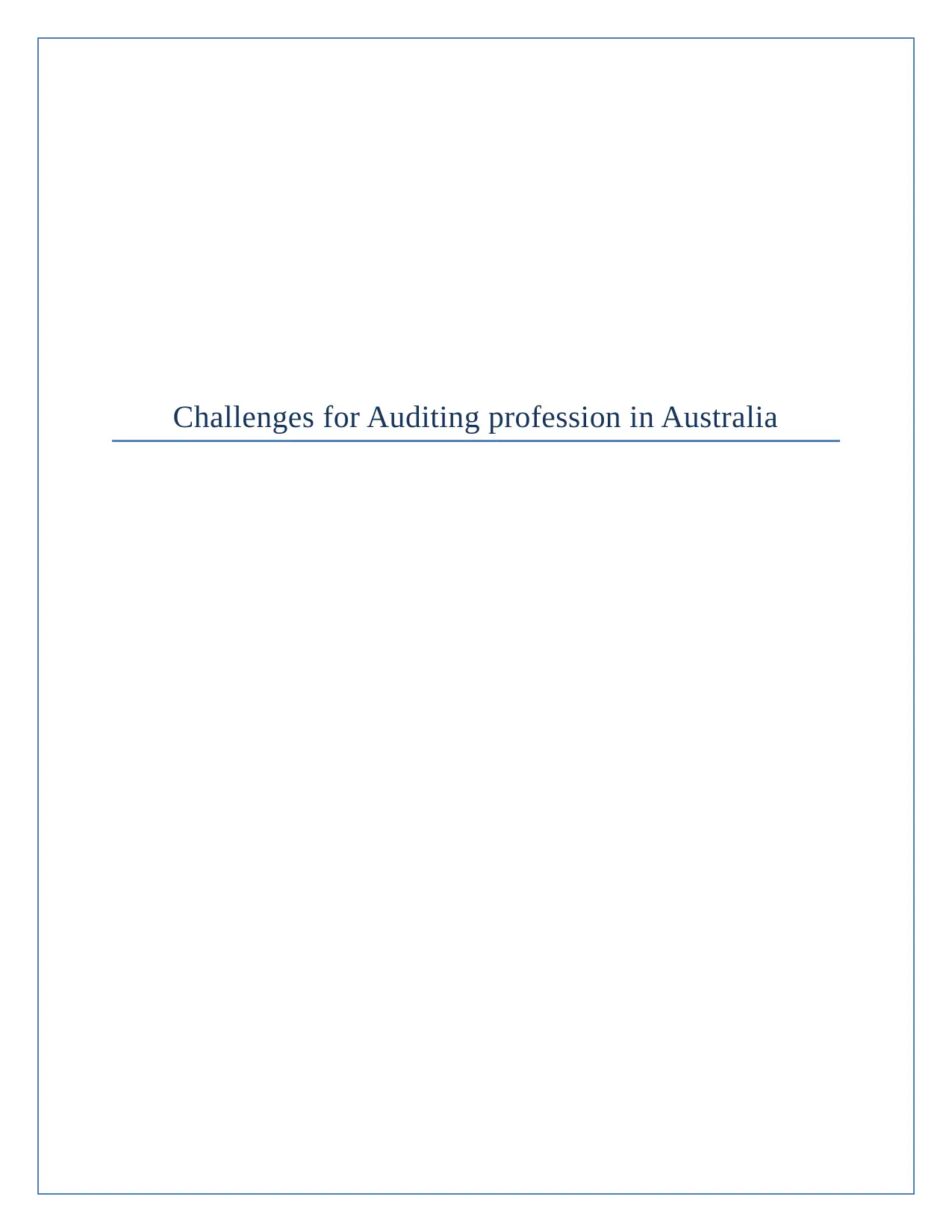
Challenges for Auditing profession in Australia
Paraphrase This Document
Need a fresh take? Get an instant paraphrase of this document with our AI Paraphraser
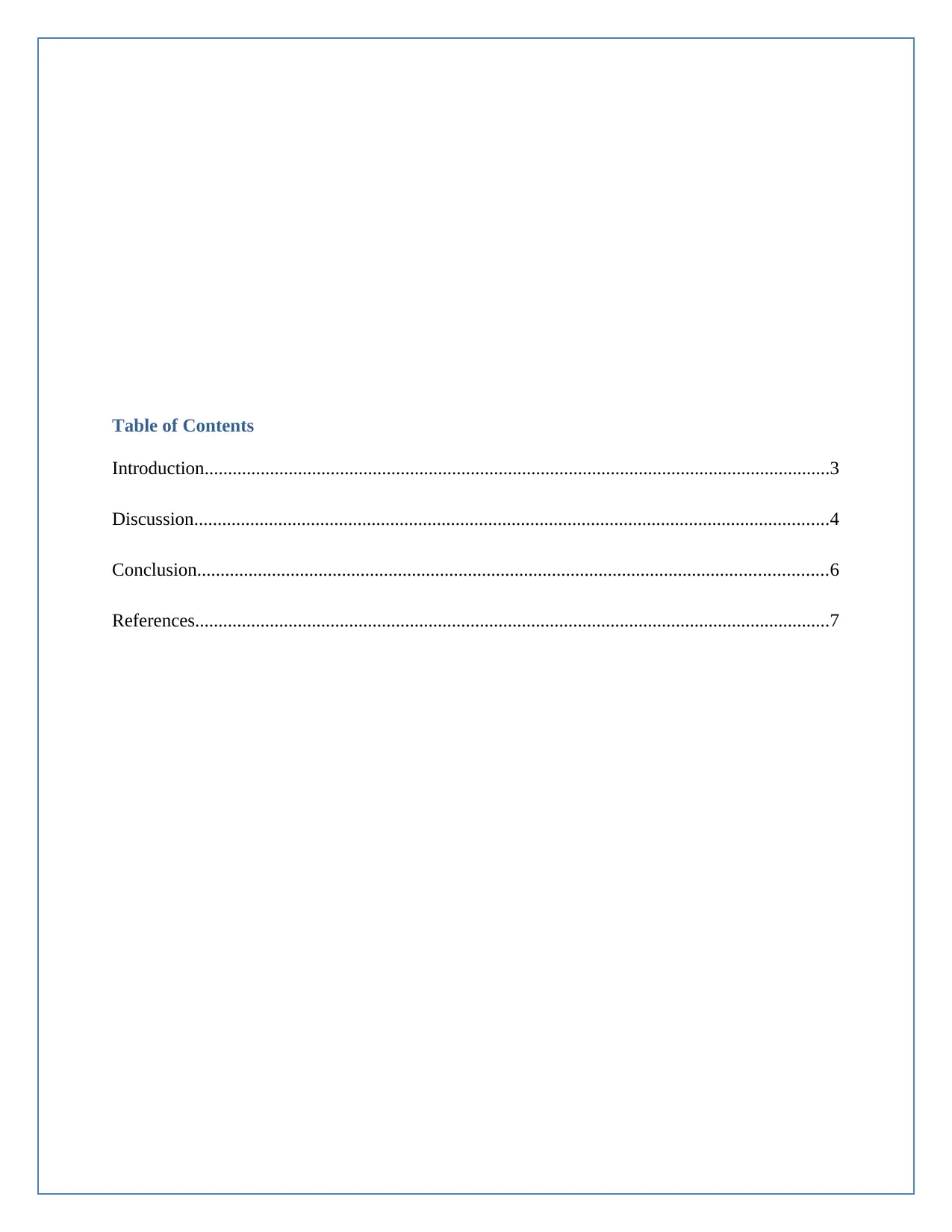
Table of Contents
Introduction......................................................................................................................................3
Discussion........................................................................................................................................4
Conclusion.......................................................................................................................................6
References........................................................................................................................................7
Introduction......................................................................................................................................3
Discussion........................................................................................................................................4
Conclusion.......................................................................................................................................6
References........................................................................................................................................7
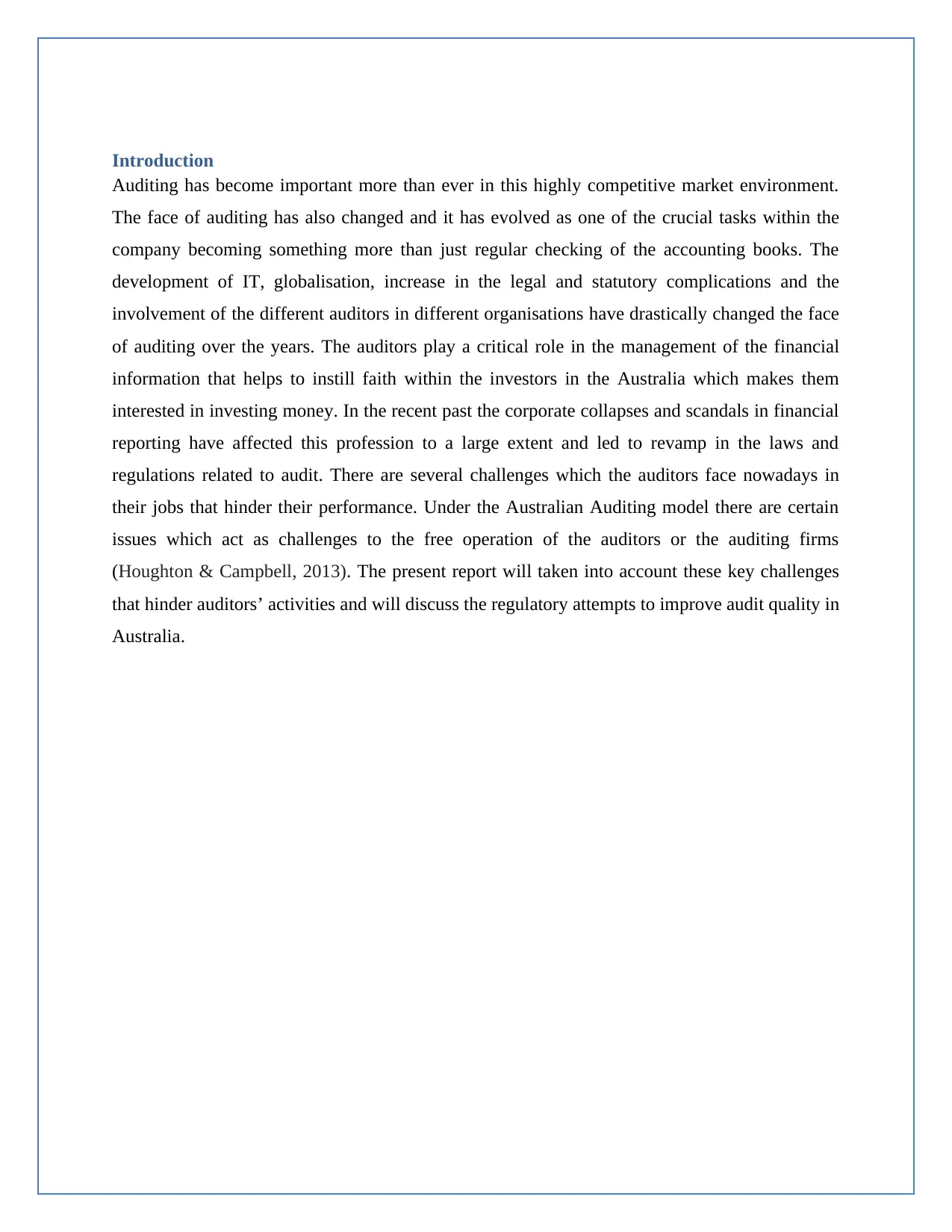
Introduction
Auditing has become important more than ever in this highly competitive market environment.
The face of auditing has also changed and it has evolved as one of the crucial tasks within the
company becoming something more than just regular checking of the accounting books. The
development of IT, globalisation, increase in the legal and statutory complications and the
involvement of the different auditors in different organisations have drastically changed the face
of auditing over the years. The auditors play a critical role in the management of the financial
information that helps to instill faith within the investors in the Australia which makes them
interested in investing money. In the recent past the corporate collapses and scandals in financial
reporting have affected this profession to a large extent and led to revamp in the laws and
regulations related to audit. There are several challenges which the auditors face nowadays in
their jobs that hinder their performance. Under the Australian Auditing model there are certain
issues which act as challenges to the free operation of the auditors or the auditing firms
(Houghton & Campbell, 2013). The present report will taken into account these key challenges
that hinder auditors’ activities and will discuss the regulatory attempts to improve audit quality in
Australia.
Auditing has become important more than ever in this highly competitive market environment.
The face of auditing has also changed and it has evolved as one of the crucial tasks within the
company becoming something more than just regular checking of the accounting books. The
development of IT, globalisation, increase in the legal and statutory complications and the
involvement of the different auditors in different organisations have drastically changed the face
of auditing over the years. The auditors play a critical role in the management of the financial
information that helps to instill faith within the investors in the Australia which makes them
interested in investing money. In the recent past the corporate collapses and scandals in financial
reporting have affected this profession to a large extent and led to revamp in the laws and
regulations related to audit. There are several challenges which the auditors face nowadays in
their jobs that hinder their performance. Under the Australian Auditing model there are certain
issues which act as challenges to the free operation of the auditors or the auditing firms
(Houghton & Campbell, 2013). The present report will taken into account these key challenges
that hinder auditors’ activities and will discuss the regulatory attempts to improve audit quality in
Australia.
⊘ This is a preview!⊘
Do you want full access?
Subscribe today to unlock all pages.

Trusted by 1+ million students worldwide
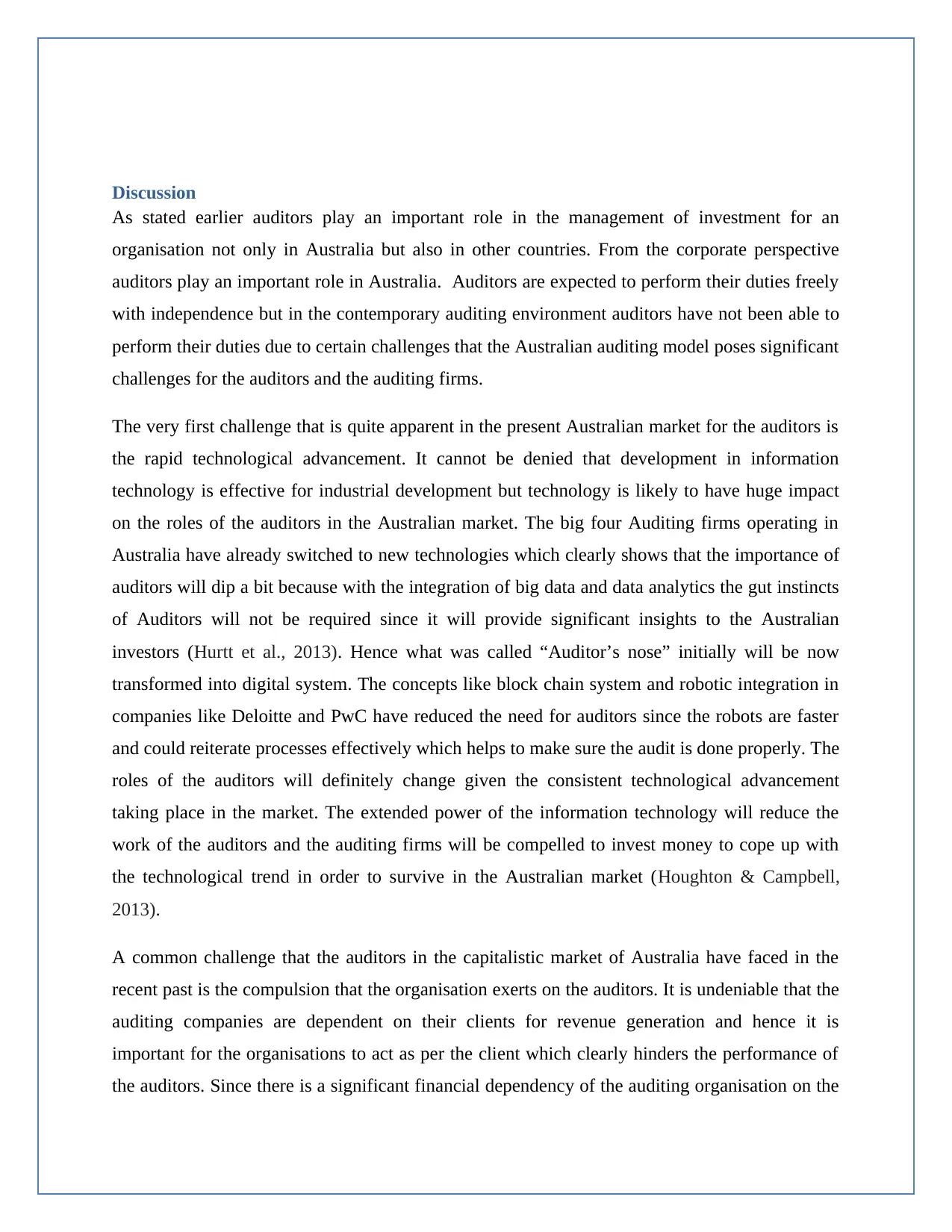
Discussion
As stated earlier auditors play an important role in the management of investment for an
organisation not only in Australia but also in other countries. From the corporate perspective
auditors play an important role in Australia. Auditors are expected to perform their duties freely
with independence but in the contemporary auditing environment auditors have not been able to
perform their duties due to certain challenges that the Australian auditing model poses significant
challenges for the auditors and the auditing firms.
The very first challenge that is quite apparent in the present Australian market for the auditors is
the rapid technological advancement. It cannot be denied that development in information
technology is effective for industrial development but technology is likely to have huge impact
on the roles of the auditors in the Australian market. The big four Auditing firms operating in
Australia have already switched to new technologies which clearly shows that the importance of
auditors will dip a bit because with the integration of big data and data analytics the gut instincts
of Auditors will not be required since it will provide significant insights to the Australian
investors (Hurtt et al., 2013). Hence what was called “Auditor’s nose” initially will be now
transformed into digital system. The concepts like block chain system and robotic integration in
companies like Deloitte and PwC have reduced the need for auditors since the robots are faster
and could reiterate processes effectively which helps to make sure the audit is done properly. The
roles of the auditors will definitely change given the consistent technological advancement
taking place in the market. The extended power of the information technology will reduce the
work of the auditors and the auditing firms will be compelled to invest money to cope up with
the technological trend in order to survive in the Australian market (Houghton & Campbell,
2013).
A common challenge that the auditors in the capitalistic market of Australia have faced in the
recent past is the compulsion that the organisation exerts on the auditors. It is undeniable that the
auditing companies are dependent on their clients for revenue generation and hence it is
important for the organisations to act as per the client which clearly hinders the performance of
the auditors. Since there is a significant financial dependency of the auditing organisation on the
As stated earlier auditors play an important role in the management of investment for an
organisation not only in Australia but also in other countries. From the corporate perspective
auditors play an important role in Australia. Auditors are expected to perform their duties freely
with independence but in the contemporary auditing environment auditors have not been able to
perform their duties due to certain challenges that the Australian auditing model poses significant
challenges for the auditors and the auditing firms.
The very first challenge that is quite apparent in the present Australian market for the auditors is
the rapid technological advancement. It cannot be denied that development in information
technology is effective for industrial development but technology is likely to have huge impact
on the roles of the auditors in the Australian market. The big four Auditing firms operating in
Australia have already switched to new technologies which clearly shows that the importance of
auditors will dip a bit because with the integration of big data and data analytics the gut instincts
of Auditors will not be required since it will provide significant insights to the Australian
investors (Hurtt et al., 2013). Hence what was called “Auditor’s nose” initially will be now
transformed into digital system. The concepts like block chain system and robotic integration in
companies like Deloitte and PwC have reduced the need for auditors since the robots are faster
and could reiterate processes effectively which helps to make sure the audit is done properly. The
roles of the auditors will definitely change given the consistent technological advancement
taking place in the market. The extended power of the information technology will reduce the
work of the auditors and the auditing firms will be compelled to invest money to cope up with
the technological trend in order to survive in the Australian market (Houghton & Campbell,
2013).
A common challenge that the auditors in the capitalistic market of Australia have faced in the
recent past is the compulsion that the organisation exerts on the auditors. It is undeniable that the
auditing companies are dependent on their clients for revenue generation and hence it is
important for the organisations to act as per the client which clearly hinders the performance of
the auditors. Since there is a significant financial dependency of the auditing organisation on the
Paraphrase This Document
Need a fresh take? Get an instant paraphrase of this document with our AI Paraphraser
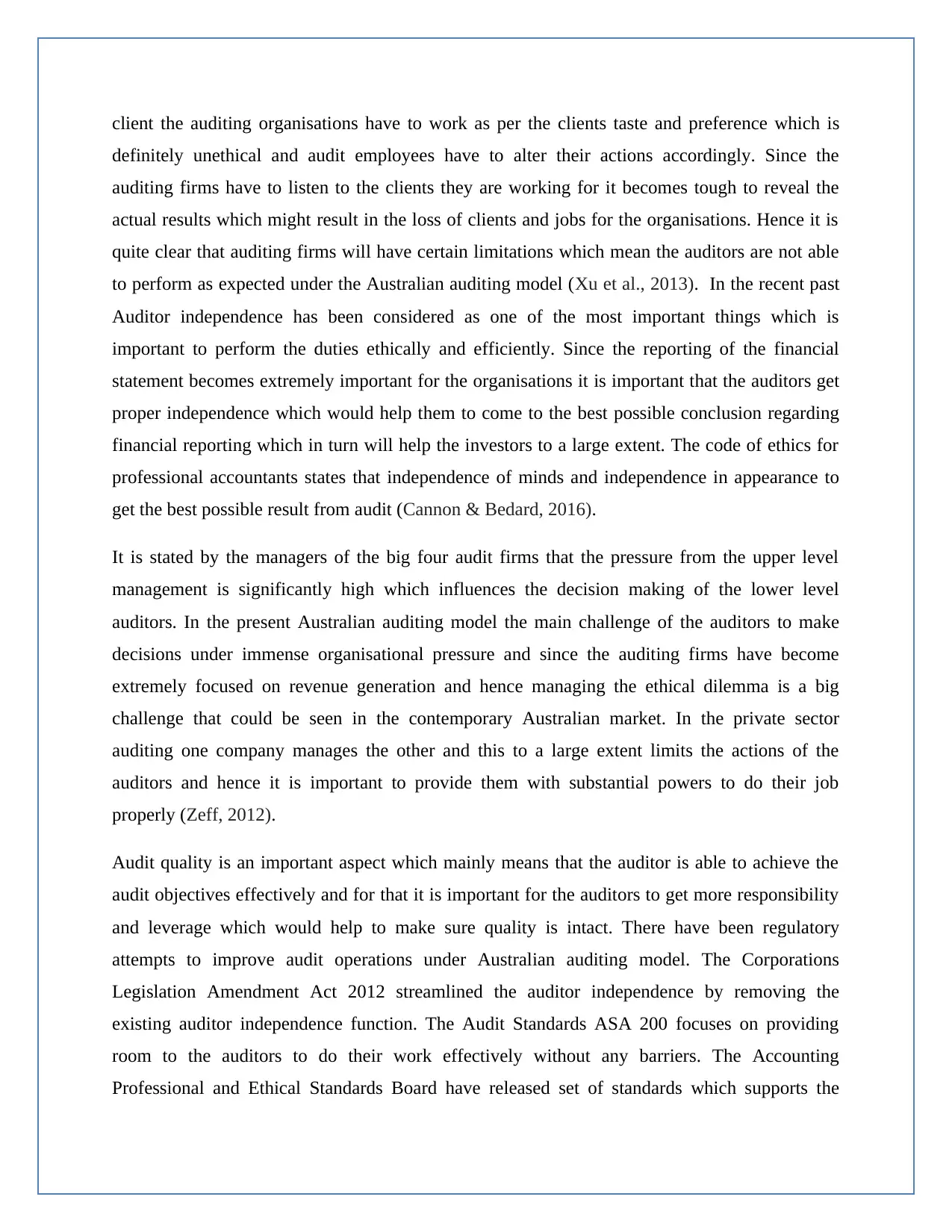
client the auditing organisations have to work as per the clients taste and preference which is
definitely unethical and audit employees have to alter their actions accordingly. Since the
auditing firms have to listen to the clients they are working for it becomes tough to reveal the
actual results which might result in the loss of clients and jobs for the organisations. Hence it is
quite clear that auditing firms will have certain limitations which mean the auditors are not able
to perform as expected under the Australian auditing model (Xu et al., 2013). In the recent past
Auditor independence has been considered as one of the most important things which is
important to perform the duties ethically and efficiently. Since the reporting of the financial
statement becomes extremely important for the organisations it is important that the auditors get
proper independence which would help them to come to the best possible conclusion regarding
financial reporting which in turn will help the investors to a large extent. The code of ethics for
professional accountants states that independence of minds and independence in appearance to
get the best possible result from audit (Cannon & Bedard, 2016).
It is stated by the managers of the big four audit firms that the pressure from the upper level
management is significantly high which influences the decision making of the lower level
auditors. In the present Australian auditing model the main challenge of the auditors to make
decisions under immense organisational pressure and since the auditing firms have become
extremely focused on revenue generation and hence managing the ethical dilemma is a big
challenge that could be seen in the contemporary Australian market. In the private sector
auditing one company manages the other and this to a large extent limits the actions of the
auditors and hence it is important to provide them with substantial powers to do their job
properly (Zeff, 2012).
Audit quality is an important aspect which mainly means that the auditor is able to achieve the
audit objectives effectively and for that it is important for the auditors to get more responsibility
and leverage which would help to make sure quality is intact. There have been regulatory
attempts to improve audit operations under Australian auditing model. The Corporations
Legislation Amendment Act 2012 streamlined the auditor independence by removing the
existing auditor independence function. The Audit Standards ASA 200 focuses on providing
room to the auditors to do their work effectively without any barriers. The Accounting
Professional and Ethical Standards Board have released set of standards which supports the
definitely unethical and audit employees have to alter their actions accordingly. Since the
auditing firms have to listen to the clients they are working for it becomes tough to reveal the
actual results which might result in the loss of clients and jobs for the organisations. Hence it is
quite clear that auditing firms will have certain limitations which mean the auditors are not able
to perform as expected under the Australian auditing model (Xu et al., 2013). In the recent past
Auditor independence has been considered as one of the most important things which is
important to perform the duties ethically and efficiently. Since the reporting of the financial
statement becomes extremely important for the organisations it is important that the auditors get
proper independence which would help them to come to the best possible conclusion regarding
financial reporting which in turn will help the investors to a large extent. The code of ethics for
professional accountants states that independence of minds and independence in appearance to
get the best possible result from audit (Cannon & Bedard, 2016).
It is stated by the managers of the big four audit firms that the pressure from the upper level
management is significantly high which influences the decision making of the lower level
auditors. In the present Australian auditing model the main challenge of the auditors to make
decisions under immense organisational pressure and since the auditing firms have become
extremely focused on revenue generation and hence managing the ethical dilemma is a big
challenge that could be seen in the contemporary Australian market. In the private sector
auditing one company manages the other and this to a large extent limits the actions of the
auditors and hence it is important to provide them with substantial powers to do their job
properly (Zeff, 2012).
Audit quality is an important aspect which mainly means that the auditor is able to achieve the
audit objectives effectively and for that it is important for the auditors to get more responsibility
and leverage which would help to make sure quality is intact. There have been regulatory
attempts to improve audit operations under Australian auditing model. The Corporations
Legislation Amendment Act 2012 streamlined the auditor independence by removing the
existing auditor independence function. The Audit Standards ASA 200 focuses on providing
room to the auditors to do their work effectively without any barriers. The Accounting
Professional and Ethical Standards Board have released set of standards which supports the
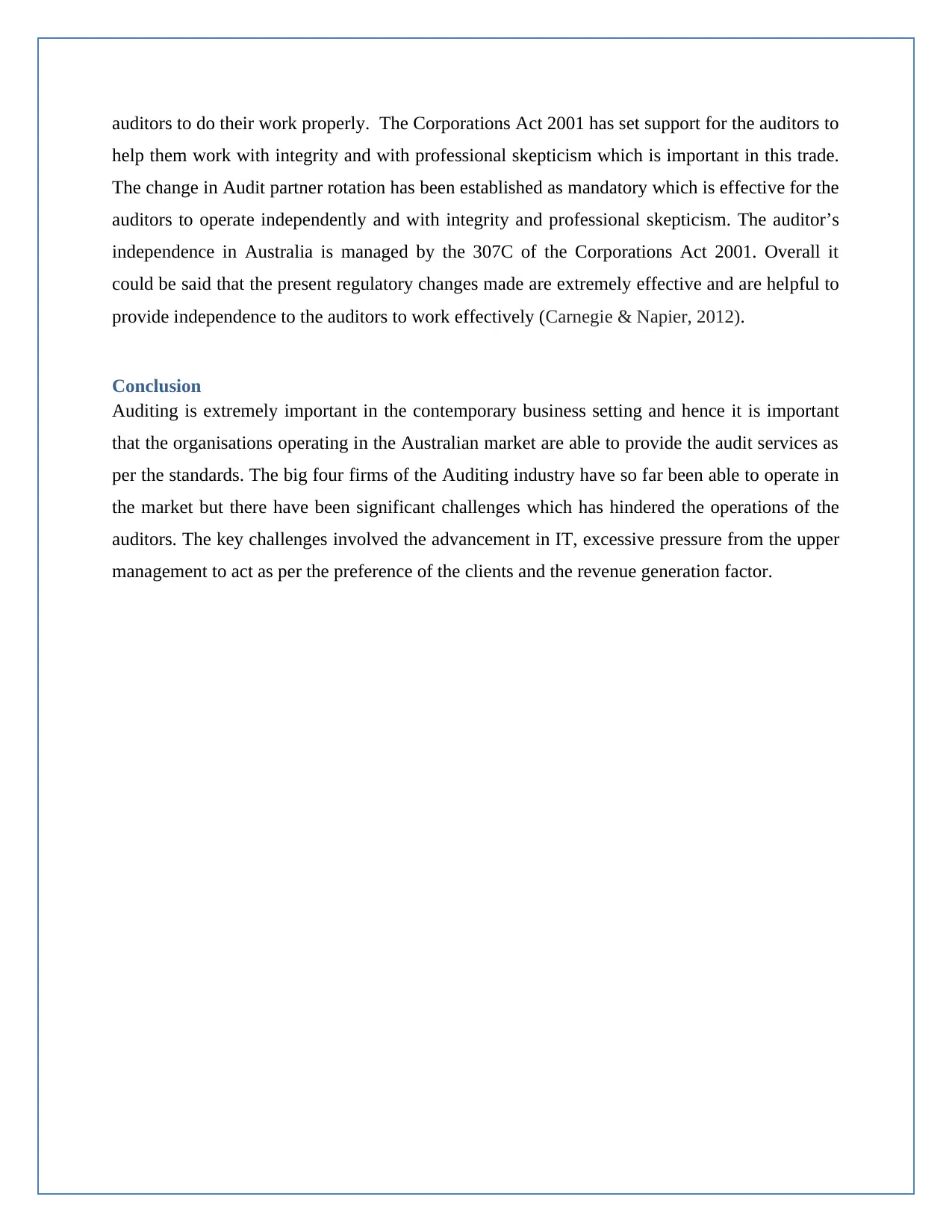
auditors to do their work properly. The Corporations Act 2001 has set support for the auditors to
help them work with integrity and with professional skepticism which is important in this trade.
The change in Audit partner rotation has been established as mandatory which is effective for the
auditors to operate independently and with integrity and professional skepticism. The auditor’s
independence in Australia is managed by the 307C of the Corporations Act 2001. Overall it
could be said that the present regulatory changes made are extremely effective and are helpful to
provide independence to the auditors to work effectively (Carnegie & Napier, 2012).
Conclusion
Auditing is extremely important in the contemporary business setting and hence it is important
that the organisations operating in the Australian market are able to provide the audit services as
per the standards. The big four firms of the Auditing industry have so far been able to operate in
the market but there have been significant challenges which has hindered the operations of the
auditors. The key challenges involved the advancement in IT, excessive pressure from the upper
management to act as per the preference of the clients and the revenue generation factor.
help them work with integrity and with professional skepticism which is important in this trade.
The change in Audit partner rotation has been established as mandatory which is effective for the
auditors to operate independently and with integrity and professional skepticism. The auditor’s
independence in Australia is managed by the 307C of the Corporations Act 2001. Overall it
could be said that the present regulatory changes made are extremely effective and are helpful to
provide independence to the auditors to work effectively (Carnegie & Napier, 2012).
Conclusion
Auditing is extremely important in the contemporary business setting and hence it is important
that the organisations operating in the Australian market are able to provide the audit services as
per the standards. The big four firms of the Auditing industry have so far been able to operate in
the market but there have been significant challenges which has hindered the operations of the
auditors. The key challenges involved the advancement in IT, excessive pressure from the upper
management to act as per the preference of the clients and the revenue generation factor.
⊘ This is a preview!⊘
Do you want full access?
Subscribe today to unlock all pages.

Trusted by 1+ million students worldwide
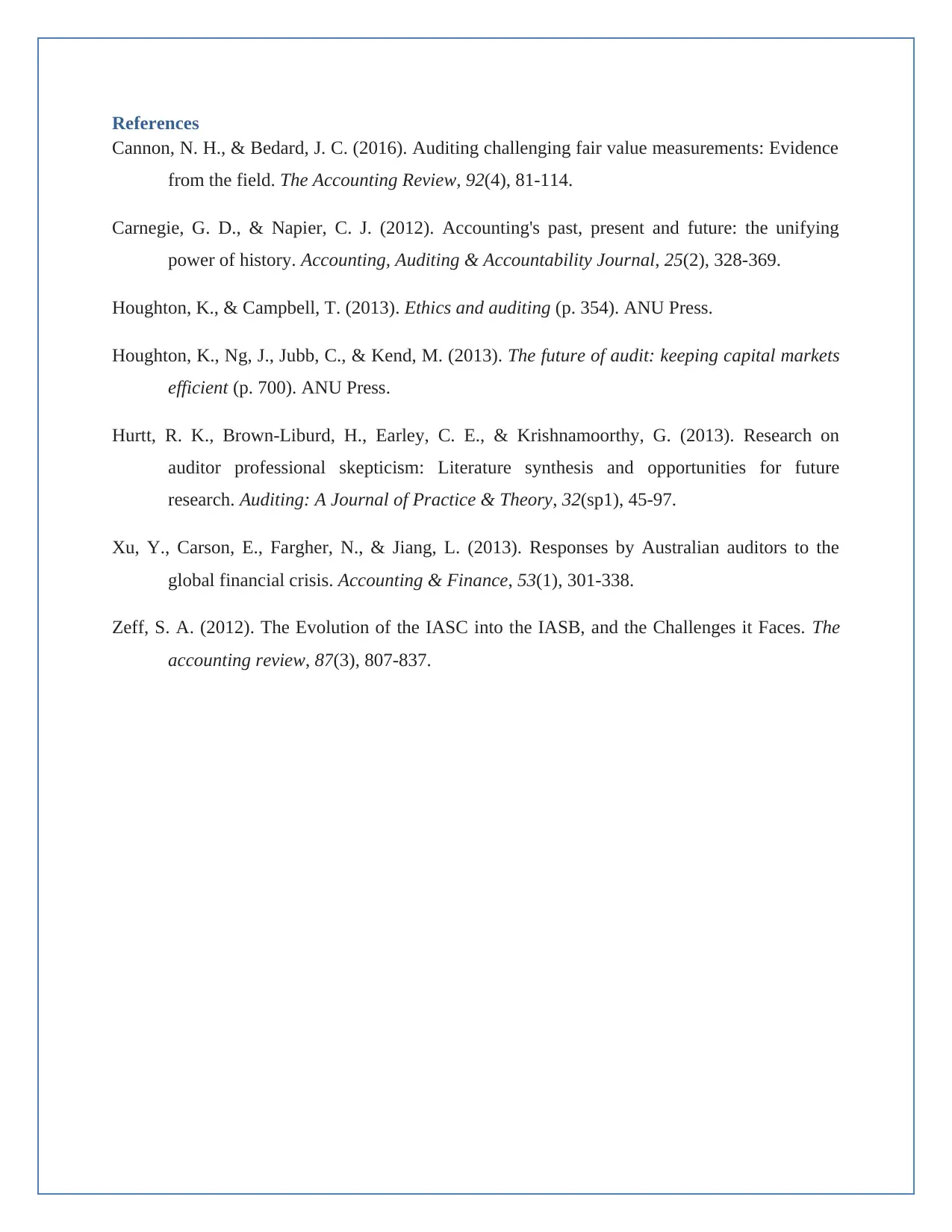
References
Cannon, N. H., & Bedard, J. C. (2016). Auditing challenging fair value measurements: Evidence
from the field. The Accounting Review, 92(4), 81-114.
Carnegie, G. D., & Napier, C. J. (2012). Accounting's past, present and future: the unifying
power of history. Accounting, Auditing & Accountability Journal, 25(2), 328-369.
Houghton, K., & Campbell, T. (2013). Ethics and auditing (p. 354). ANU Press.
Houghton, K., Ng, J., Jubb, C., & Kend, M. (2013). The future of audit: keeping capital markets
efficient (p. 700). ANU Press.
Hurtt, R. K., Brown-Liburd, H., Earley, C. E., & Krishnamoorthy, G. (2013). Research on
auditor professional skepticism: Literature synthesis and opportunities for future
research. Auditing: A Journal of Practice & Theory, 32(sp1), 45-97.
Xu, Y., Carson, E., Fargher, N., & Jiang, L. (2013). Responses by Australian auditors to the
global financial crisis. Accounting & Finance, 53(1), 301-338.
Zeff, S. A. (2012). The Evolution of the IASC into the IASB, and the Challenges it Faces. The
accounting review, 87(3), 807-837.
Cannon, N. H., & Bedard, J. C. (2016). Auditing challenging fair value measurements: Evidence
from the field. The Accounting Review, 92(4), 81-114.
Carnegie, G. D., & Napier, C. J. (2012). Accounting's past, present and future: the unifying
power of history. Accounting, Auditing & Accountability Journal, 25(2), 328-369.
Houghton, K., & Campbell, T. (2013). Ethics and auditing (p. 354). ANU Press.
Houghton, K., Ng, J., Jubb, C., & Kend, M. (2013). The future of audit: keeping capital markets
efficient (p. 700). ANU Press.
Hurtt, R. K., Brown-Liburd, H., Earley, C. E., & Krishnamoorthy, G. (2013). Research on
auditor professional skepticism: Literature synthesis and opportunities for future
research. Auditing: A Journal of Practice & Theory, 32(sp1), 45-97.
Xu, Y., Carson, E., Fargher, N., & Jiang, L. (2013). Responses by Australian auditors to the
global financial crisis. Accounting & Finance, 53(1), 301-338.
Zeff, S. A. (2012). The Evolution of the IASC into the IASB, and the Challenges it Faces. The
accounting review, 87(3), 807-837.
1 out of 7
Related Documents
Your All-in-One AI-Powered Toolkit for Academic Success.
+13062052269
info@desklib.com
Available 24*7 on WhatsApp / Email
![[object Object]](/_next/static/media/star-bottom.7253800d.svg)
Unlock your academic potential
Copyright © 2020–2026 A2Z Services. All Rights Reserved. Developed and managed by ZUCOL.





